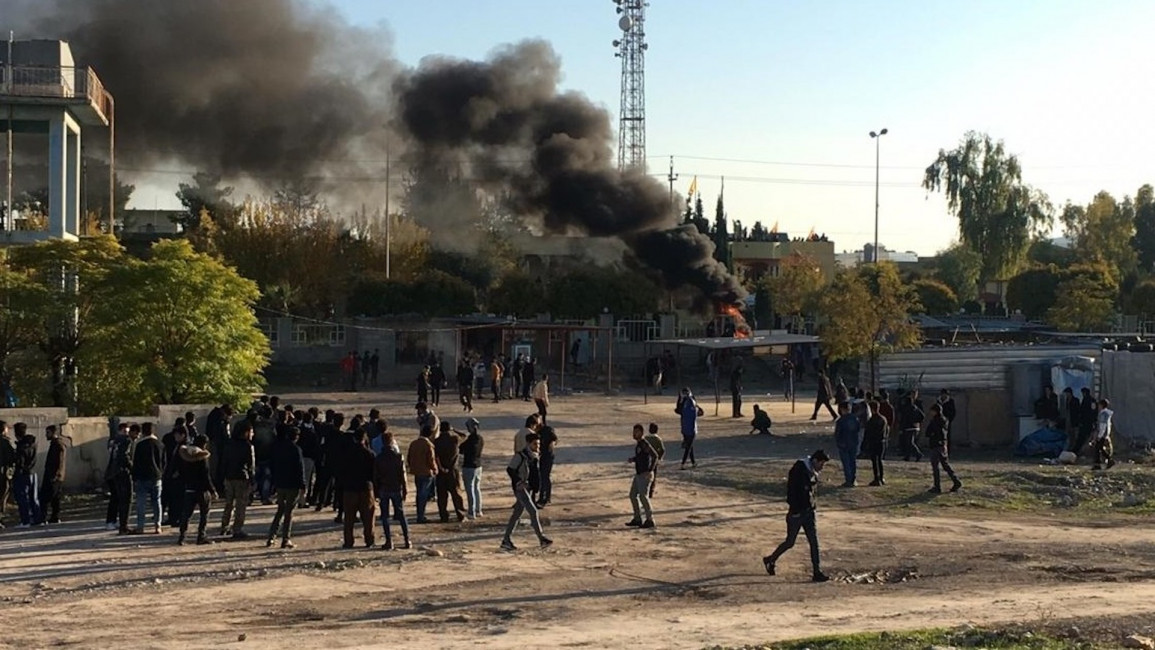Euro-Med rights monitor slams Iraqi-Kurdish authorities for gross violation of protesters' human rights
The rights monitor accused the Kurdish authorities of failing in their responsibility to maintain security and order in the Sulaimaniyah region, which has contributed to the deaths of seven protesters between Monday and Wednesday, including two children.
Protestors came under direct fire from guards of the headquarters of the Patriotic Union of Kurdistan, the Kurdistan National Party, and the Gorran Movement, the monitor said.
The protestors were shot dead in the northern Kurdish region during a march against the governing elite that saw demonstrators torch party offices.
The demonstrations in Sulaimaniyah erupted this week over unpaid salaries.
While the rallies have escalated in towns, the main city of Sulaimaniyah has not seen a huge turnout due to tightened security measures.
Authorities imposed a crackdown on social media sites to prevent protesters from mobilising.
Euro-Med Monitor has called on authorities in the Iraqi Kurdistan region to open an investigation into the attacks on protestors and to hold the perpetrators to account.
Authorities have clamped down on protests since they restarted at the beginning of this month, according to the monitor.
|
A protest on 3 December saw 23 activists and 12 teachers arrested, amid the use of live and rubber bullets by security forces.
'Insult'
Commenting on the demonstrations, Kurdish activist Saman Amin told The New Arab's Arabic-language service, Al-Araby Al-Jadeed, that hunger and poverty have increased in the region while the wealthy have become leading figures of political parties and security forces.
"The demonstrations in Baghdad and southern Iraq were a catalyst for the eruption of demonstrations in Kurdistan. The reasons are almost the same," he said.
A Kurdish human rights activist living in Sulaimaniyah told Al-Araby Al-Jadeed that the "Kurdish security forces continue to arrest activists, demonstrators and journalists who support the popular movement".
He said that "the numbers of demonstrators in Chamchamal and Sayed Sadiq decline during the day to prevent mass arrests and then pick up at the beginning of the evening".
The activist, who preferred not to be named for security reasons, said that "the protests in the Kurdistan region did not start till the Kurdish government insulted its people".
A member of the Patriotic Union of Kurdistan told Al-Araby Al-Jadeed that a meeting between different parties is scheduled to take place in Erbil to find a solution on the issue of late salary payments.
|
Targeting of press organisations
On Monday, Iraqi-Kurdistan's Prime Minister Masrour Barzani held a press conference to address the protests, saying that demonstrations are a fundamental right of the people.
However, the official noted grievances were being exploited by some and urged protesters to remain patient as the government attempts to overcome hurdles.
Rights defenders have been increasingly concerned about security forces targeting press organisations in the region, specifically local television station NRT.
Before dawn on Monday, local security forces stormed NRT's Sulaimaniyah bureau and halted its live broadcast, the channel's newsroom chief Rebwar Abdulrahman told AFP.
He said some of the channel's equipment had been confiscated and other equipment had been broken during the raid.
"Stopping a channel's broadcast is a blatant violation of the region's press law," Abdulrahman said.
Like the rest of Iraq, media outlets in the Kurdish region are nearly all linked to political figures or parties. NRT is owned by a member of the New Generation Movement, a Kurdish opposition party.
Press freedoms in Kurdish Iraq have been enshrined by a regional law for over a decade.
The Committee to Protect Journalists (CPJ) said it was "very concerned" by the recent shutdown, which comes after NRT's offices in the regional capital Erbil and northwest city of Duhok faced similar closures this year.
"It's a pattern for authorities in Iraqi Kurdistan, be it in Sulaimaniyah or Erbil or Duhok, and an attempt to silence NRT for its coverage of protests that have been ongoing over unpaid salaries for public servants and lack of public services," said CPJ's Ignacio Miguel Delgado.
Agencies contributed to this report.
Follow us on Facebook, Twitter and Instagram to stay connected



